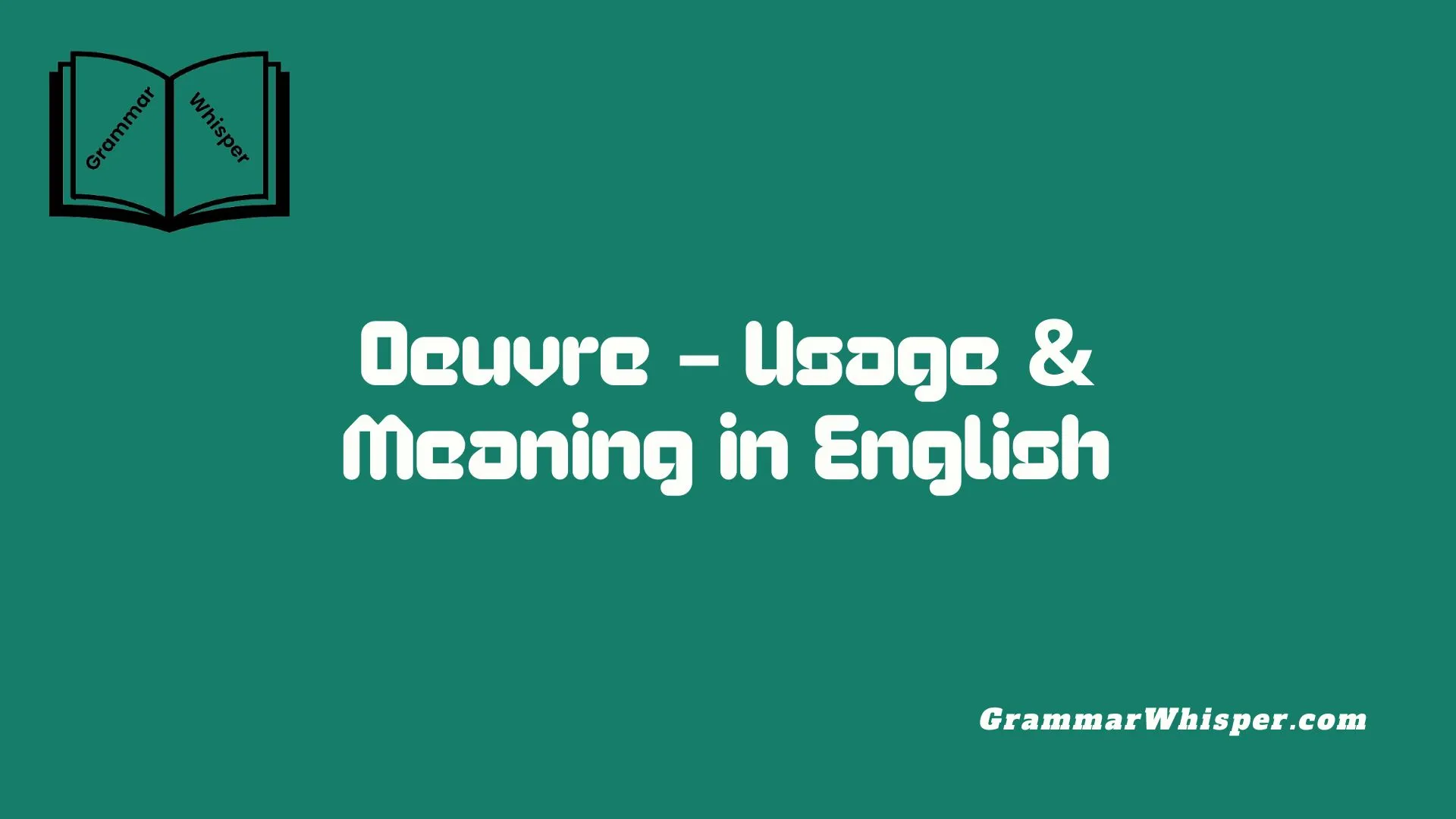When you first come across the word oeuvre, it might strike you as just a polished or elegant synonym for “work.” But look a little deeper, and you’ll find that it carries a far more specific and nuanced meaning. In modern English, oeuvre is used to describe the complete body of work a creator produces – whether that’s an artist, a writer, a filmmaker, or anyone pursuing something creative. It doesn’t just mean one project or a solitary piece. Instead, it refers to the entire range of their efforts, from the raw sketches they made early in their careers to the refined masterpieces they developed later. The meaning is deeper, touching on every phase of an individual’s artistic journey.
To truly grasp the power of oeuvre, you need to consider its usage and how it represents the scope of a person’s creative life. Imagine someone saying, “Her oeuvre is iconic.” They’re not talking about just a book or a painting – they’re pointing to the full output of her career, the total sum of her creative contributions. The word oeuvre implies depth, weight, and a broader impact on art and culture. It reflects not just what someone has done, but what they’ve created over an entire lifetime.
What Does “Oeuvre” Mean in Modern English?
Oeuvre (pronounced AY-vruh or UH-vruh) refers to the entire set of creative output by an individual. Instead of saying “his works” or “her books,” you’d call them an artist’s oeuvre – the full expression of their creative journey.
A critic might write, “Her oeuvre reflects a consistent concern with identity.” This usage feels scholarly yet approachable, lending insight without pretension.
Oeuvre: Origins, Etymology & Evolution
Tracing oeuvre takes us back to Old French oeuvre (“work”), derived from Latin opera. Originally, it described any physical or intellectual labor.
Over centuries, English adopted it in the early 19th century to highlight artistic achievements, reserving it for bodies of significant creative output – not just any piece.
Its French spelling and pronunciation stayed intact, since English borrowed it as a loanword for its refined nuance – a phenomenon linguists call “imported prestige.”
Pronunciation of “Oeuvre” (US & UK)
Getting pronunciation right matters for clarity and credibility.
| Dialect | IPA | Pronunciation Tip |
| UK | /ˈɜːv.rə/ | Sounds like “UR-vruh” |
| US | /ˈuːv.rə/ or /ˈʊv.rə/ | Think “OO-vruh” or “UH-vruh” |
Common mistakes include reading it as “oh-ev-er” or “oh-vure”. Practice with an online resource like Forvo to nail the phonetics.
Using “Oeuvre” in Sentences
Here’s how “oeuvre” appears across contexts:
- Art: “Picasso’s oeuvre includes thousands of works across media.”
- Film: “Steven Spielberg’s oeuvre owes much to his early TV career.”
- Literature: “Toni Morrison’s oeuvre tackles the Black experience powerfully.”
Effective sentence starters:
- “This early work hints at the thematic concerns of her oeuvre.”
- “Critics often group his oeuvre into three distinct creative periods.”
Use it where you’d otherwise say “body of work” – but with more impact.
Real-World Examples of “Oeuvre”
Let’s look at credible sources using “oeuvre” in meaningful ways:
| Source | Quote | Context |
| The New York Times | “The director’s oeuvre examines the isolation of modern life.” | Film criticism |
| The Guardian | “This novel stands out in her oeuvre for its bold structure.” | Literary analysis |
| Columbia Journal | “His entire oeuvre reveals a fascination with memory and time.” | Academic essay |
Seeing it used frequently in respected outlets gives you both confidence and authority.
Synonyms and Near-Synonyms for “Oeuvre”
If you want variation, here are alternatives and when to use them:
- Corpus – academic focus
- Body of work – neutral, all-purpose
- Repertoire – often used for performance-based creators
- Portfolio – typically for visual artists/designers
Catalogue/catalog – archival, collection-like contexts
| Term | Ideal Context | Tone |
| oeuvre | Arts, lofty contexts | Sophisticated |
| corpus | Academic, scholarly | Formal |
| body of work | General use | Neutral |
| repertoire | Musicians, performers | Informative |
| portfolio | Artists/designers | Professional |
Oeuvre vs. Magnum Opus – What Sets Them Apart?
Though related, oeuvre and magnum opus serve distinct purposes:
- Oeuvre: Complete body of work
- Magnum opus: Creator’s single crowning achievement
For example:
- Beethoven’s oeuvre includes 9 symphonies, concertos, sonatas
His magnum opus is often recognized as Symphony No. 9
| Term | Scope | Example |
| oeuvre | All creative output | Picasso’s 50+ styles |
| magnum opus | Single masterpiece | Les Demoiselles d’Avignon |
Critical Role of “Oeuvre” in Analysis
Why scholars prefer “oeuvre”:
- Marks intentionality across a body of work
- Conveys evolution, consistency, and thematic depth
- Provides analytical framework: “This novel highlights late-stage shifts in her oeuvre.”
Case Study: Virginia Woolf’s Oeuvre
Mr. A. J. Pitt said in his 2017 essay:
“Woolf’s oeuvre captures an evolving feminist consciousness.”
This precise usage lends analytical depth, earning scholarly credibility.
Common Confusions & Misuse to Avoid
Watch out for these pitfalls:
- Using oeuvre to describe one work
- Confusing oeuvre with opera or opus
- Mispronunciation shows lack of familiarity
- Overuse in casual contexts sounds pretentious
Final Thoughts
Use oeuvre when:
- Discussing a creator’s full catalog
- Analyzing evolution in style or theme
- Citing reviews, essays, or scholarly work
Avoid padding your casual writing; keep it purposeful.
Remember:
- Pronounce it right
- Don’t misuse it for single items
- Use it with respect for nuance
Bonus: Quick Reference Table
| Feature | Oeuvre |
| Etymology | Old French → Latin opera |
| Pronunciation | UK: /ˈɜːv.rə/ • US: /ˈuːv.rə/ |
| Meaning | Complete creative body by an individual |
| Fields | Art, literature, film, music, design |
| Synonyms | Corpus, portfolio, repertoire, body of work |
| Contrast | Magnum opus (greatest single work) |
FAQs About “Oeuvre”
Is “oeuvre” pretentious?
Not when used thoughtfully. It signals expertise not arrogance.
Can musicians have an oeuvre?
Yes – it’s used in music analysis too.
Is it ok in casual conversation?
Yes – if talking about creators’ total output in discussions or reviews.
Is there a plural form?
“Oeuvres” – eg: “Both filmmakers contributed significant oeuvres.”
What fields use “oeuvre” most?
Art, film, literature, music, architecture, sometimes fashion or academia.











